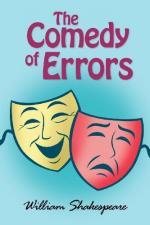|
This section contains 10,352 words (approx. 35 pages at 300 words per page) |

|
SOURCE: “Egeon's Debt: Self-Division and Self-Redemption in The Comedy of Errors,” in English Literary Renaissance, Vol. 10, No. 3, Autumn, 1980, pp. 360-83.
In the essay that follows, Freedman defends The Comedy of Errors against criticism that contends it is an early and immature effort by tracing the problem of identity in both the frame plot and the main plot.
I
Virtually every good critical introduction to The Comedy of Errors apologizes for the play. Shakespeare was a mere youth, so the story begins, when he wrote the work, “still without too much to say about love, politics, or human nature.”1 The generic conventions of farce provided their own peculiar restraints, since farce is a kind of drama “that not even Shakespeare could extend beyond somewhat narrow limits.”2 Repeatedly, the reader is warned not to waste time searching for latent meanings in the text.3 Rather, we are advised to be grateful...
|
This section contains 10,352 words (approx. 35 pages at 300 words per page) |

|


